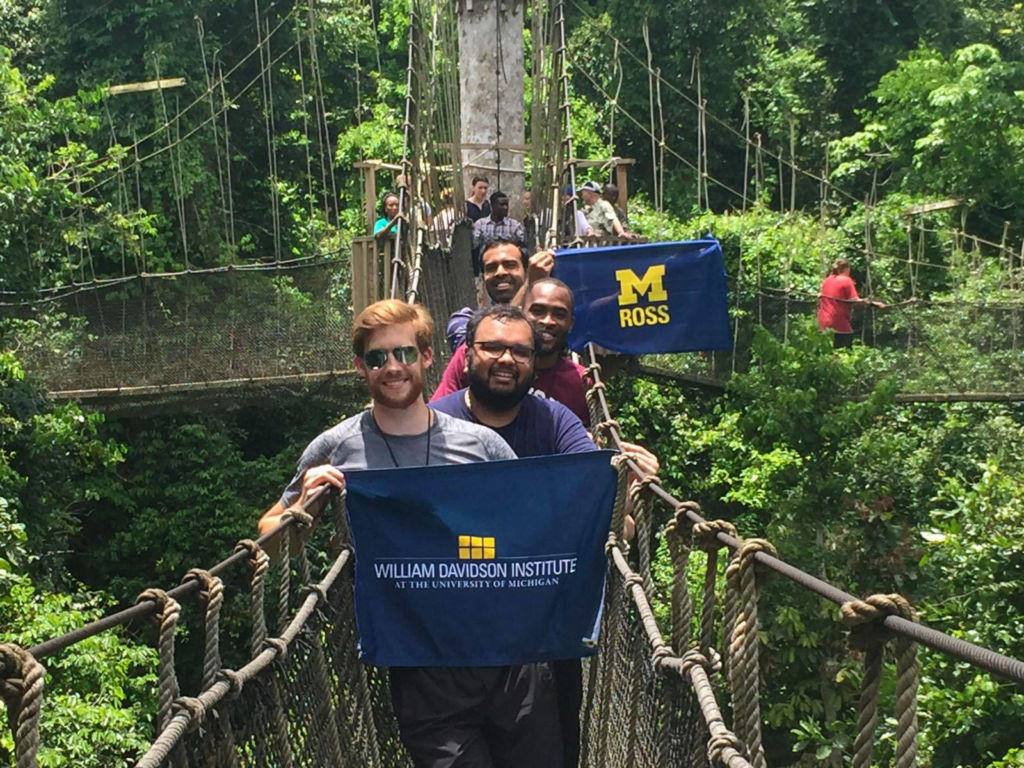WDI-Sponsored MAP Teams Aim for Impact
Thursday, March 21, 2019

A 2018 WDI MAP team in Ghana.
Carrie Boyle, a MBA student at Michigan’s Ross School of Business, hopes to work in philanthropy somewhere in the U.S. after graduation. But for a couple of weeks in March, she is excited to be traveling to India as part of the school’s annual Multidisciplinary Action Projects (MAP).
“Working in another country is something I may never get the chance to do again,” she said. “This will be my first time in India and the country really interests me.”
Boyle and her teammates will work with Michigan Academy for the Development of Entrepreneurs (MADE), a nonprofit institute established at Ross by the Zell Lurie Institute for Entrepreneurial Studies, in partnership with WDI and Aparajitha Foundations. MADE works with entrepreneurship development organizations in India to help entrepreneurs operating small- and medium-sized enterprises (SMEs) succeed.
Boyle said she had some criteria when looking for MAPs that interested her.
“I wanted an opportunity to be on the ground having meaningful conversations with the people most immediately impacted by SMEs,” she said. “SMEs employ so many people and impact so many lives.”
Her teammate Shoko Wadano said she too is interested in working with SMEs, “which are very common in India.”
“I’m interested in how businesses mature in India,” she said. “I want to learn what pressures and impacts SMEs have in common, and what kind of value we can bring to them.”
WDI is sponsoring the MADE MAP project along with 10 others this year. MAP is an action-based learning course in which MBA students receive guidance from faculty advisors from WDI and Ross. Each project requires analytical rigor, critical thinking and teamwork. (Find out more about WDI’s MAP projects over the years here.)
After learning about their projects and conducting secondary research for several weeks, the student teams spend two to four weeks working with their organizations in the field.

David Butz
“The complementarities between the talents our students bring and what our sponsors need are sublime,” said David Butz, a WDI senior research fellow in the Healthcare sector who is an advisor on two projects. “Our students experience impact in brand new ways. Our sponsors learn, too, how disciplined management methods can yield dramatic innovations.”
Butz said he enjoys working with the student teams on MAP because it “poses such a unique challenge for both the students and their sponsor organizations, and forces us all to think big.”
“For me, the best achievements are tangible, direct and narrow but at the same time big and high-impact,” he said. “In our short time, can we help to break some key bottleneck, expedite a critical process pathway or otherwise liberate resources and expand capacity? Is the innovation scalable or replicable elsewhere? Do the students and organizations thereby feel empowered?”
Here is a summary of each WDI-sponsored MAP project:
Aravind Eye Care System – India
MAP Team: Rohan Dash, Sid Mahajan, Aman Rangan, Nik Royce
Aravind Eye Care System (AECS) is a vast network of hospitals, clinics, community outreach efforts, factories, and research and training institutes in south India that has treated more than 32 million patients and has performed 4 million surgeries since its 1976 founding.
AECS opened a tertiary eye care center in Chennai in September 2017 that will ultimately serve more patients than any other facility in the AECS system. The MAP team will formulate a detailed three-year strategic plan for Aravind Eye Hospital in Chennai.
CURE International, Inc. – Kenya, Ethiopia, Zambia, Uganda
MAP Team: Dominique James, Sarah Raney, Hannah Viertel, Olga Vilner Gor
CURE operates clubfoot clinics in 17 countries around the world, each tasked with helping children and families deal with the congenital deformity that twists the foot, making it difficult or impossible to walk.
For CURE, the student team will develop a strategic evaluation framework to assess opportunities for market entry and expansion building on global data.
Ghana Emergency Medicine Collaborative – Ghana
MAP Team: Benjamin Desmond, Benjamin Quam, Nicholas Springmann, Vishnu Suresh
The Ghana Emergency Medicine Collaborative aims to improve emergency medical care in Ghana through innovative and sustainable training programs for physician, nursing and medical students. The goal of the training programs is to increase the number of qualified emergency health care workers retained over time in areas where they are most needed.
The MBA team will formulate a detailed strategy to implement interoperable digital payment systems in Ghanian hospital emergency departments.
India Investment Fund – India
The India Investment Fund is working to become the first international, student-run fund at the Ross School of Business. Ross MBA students would be responsible for investing, managing and growing a real investment portfolio.
MAP Team: Charlie Manzoni, Patrick Riley, Queenie Shan, Sheetal Singh
The student team will conduct due diligence on Indian small- and medium-sized enterprises to assess viability for investments, and an appropriate financing instrument.
Infra Group – Ethiopia
MAP Team: Rin Chou, Chandler Greene, Yuki Ito, Brittany Minor
Infra Group is diversified international group with business units in financial services, industries and infrastructure development. Infra Group helps build a more prosperous society through global-scale business development with integrity as its top priority.
The MAP team will conduct due diligence on a group of small- and medium-sized enterprises (SMEs), and recommend which ones to invest in and what amount to invest.
Lviv Business School & Ukranian Catholic University – Ukraine
MAP Team: Blake Cao, Emily Fletcher, Kelsey Pace, Adam Sitts
Lviv Business School and Ukranian Catholic University is a private educational and research institution in western Ukraine.
The student team will undertake a needs assessment of the small- and medium-sized enterprises (SMEs) to determine if Lviv Business School should begin offering consulting services to these SMEs and if so, how those should be structured.
MADE – Poornatha/Aparajitha Foundations – India
MAP Team: Carrie Boyle, Lawrence Chen, Dillon Cory, Shoko Wadano
Michigan Academy for the Development of Entrepreneurs (MADE) is a nonprofit institute established at the Ross School of Business by the Zell Lurie Institute for Entrepreneurial Studies, in partnership with WDI and Aparajitha Foundations. MADE works with entrepreneurship development organizations in developing countries to give individuals operating businesses in these environments the knowledge and best practices they need to thrive.
The MAP team will develop an expansion plan for MADE in the southern Indian state of Tamil Nadu.
The Ihangane Project – Rwanda
MAP Team: Lauren Baum, Nadia Kapper, Paul Mancheski, Jason Yu
The Ihangane Project (TIP) empowers local communities to develop sustainable, effective, and patient-centered health care delivery systems that holistically respond to the needs of vulnerable populations. Partnering with Ruli District Hospital and its associated health centers, TIP is working to identify key strategies for improving health outcomes.
The student team will develop a business model to grow the ready-to-use therapeutic food that is used to treat severe, acute malnutrition.
WEEKEND MBA MAP PROJECTS
Awash Bank – Ethiopia
MAP Team: Matthew Campbell, Joshua Dodson, Joseph McCarty, Aman Suri
Awash Bank, a private, commercial bank, was established in 1995 and features more than 375 branches across the country.
The MAP team will develop a product that can provide capital to small- and medium-sized enterprises (SMEs) in Ethiopia by utilizing remittances already being sent back to that country. The students will work with the bank on all aspects of the loan product. They also will give the bank recommendations on how to monitor the loan and provide business support to SMEs that borrow from the fund.
Grace Care Center – Sri Lanka
MAP Team: Daniel Cady, Yizhou Jiang, Gerardo Martinez, Daniel Murray
The Grace Care Center (GCC) is a home to about 70 orphaned children that offers daycare services and vocational training. It also is home to several poor and displaced seniors, many of whom have chronic health issues such as hypertension and diabetes.
Past MAP student teams from the Ross School of Business developed a diabetic care center model for GCC. This year’s student team will examine the current model and make any needed updates and revisions.
International Clinical Labs – Ethiopia
MAP Team: Emily Mascarenas, Torre Palermino, Alexander Santini, Matthew Traitses
ICL was established in 2004 to provide quality laboratory service all over Ethiopia. ICL serves more than 240 health care centers throughout the country, and is expanding its service throughout Ethiopia.
The Ethiopian government is building its first medical waste incinerator facility outside the capital city of Addis Ababa and has committed to building seven more around the country. WDI is assisting a group of business managers with business plan advice who are interested in managing the business aspects of operating the incinerators. The MAP team will develop a proposal to be presented to the government later this year for the business managers to operate the incinerators.
